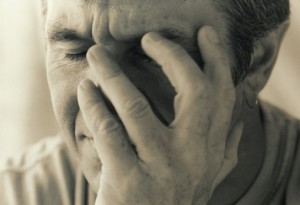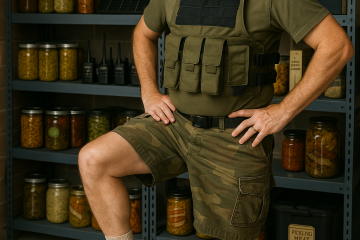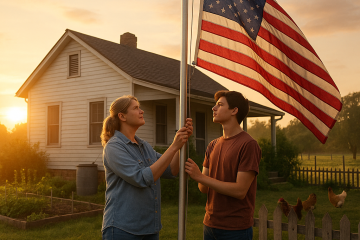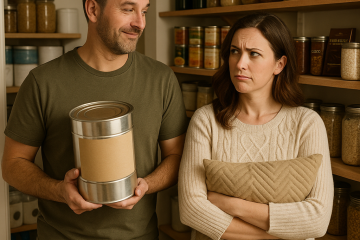by Kellene
I’ve decided to be very forthright and open in today’s article in hopes that it truly does help someone else who is struggling with depression. I often hear people say “I don’t know how you do all that you do.” I smile and thank them for their gracious compliment, but the truth of it is, I do what I do while being challenged by a significant obstacle—depression.
I realize that in this kind of forum I’m only going to be able to scratch the surface on this topic, but I firmly believe that it has not been appropriately addressed in real-life terms, and is an especially absent topic in the arena of preparedness.
First of all, allow me to dispel some myths of depression.
Depression isn’t a mood; it’s a disease. It’s a breakdown in the chemical functions of the body that impair communications from the brain to the rest of the body. The impairment of proper brain charges and chemicals is much like someone having low blood sugar, high insulin levels, a heart murmur, or a person in need of blood thinners, etc. In other words, it’s about a deficiency in the body.
Depression isn’t about “woe is me, I want to end my life,” although many forms of depression can get that serious. There are many levels of depression. Some levels of depression are the lowest of the low and considered “manic.” Other forms manifest themselves when a person eats poorly or doesn’t get enough rest. Still other forms manifest themselves on a low level throughout a person’s life or on a higher level when a great deal of decision making is thrust upon them. (it feels more like an anxiety though at that point, rather than what some people would typically associate as “depression.”)
Feeling grief or being unresponsive due to a severe tragedy in a person’s life isn’t depression. It’s responding naturally to life–although some people do have a physiological change in their chemical make-up in response to such an instance and succumb to depression as a result. It’s actually very similar to someone being injured in a car accident. Instead, a person’s heart, brain, chemical balance, etc. is injured in a collision with grief.
Contrary to assumptions, depression isn’t always about a feeling of low or sadness. Sometimes it’s feeling a serious lack of energy to do anything proactive. Sometimes the chemical imbalance demands a great deal of sleep.
Depression isn’t something that a person can just “snap out of.” You can no easier get a person to “snap out of depression” than you can get a paralyzed person to get up out of their wheelchair and walk as the result of a superhuman will.
Some who struggle with depression appear to the outsiders to be wallowing in their victimization status or their “Eeyore moods.” What many folks don’t realize is that the depressed person literally can’t see it. Getting them to “snap out of it” when they are in that state is like trying to get a blind person to see clearly. The vision of a seriously depressed person is physiologically skewed and does not represent full faculties when their brain or hormone functions aren’t working properly. A person suffering from serious depression simply does not see the world as it really is. They have chemical blinders, much like a person whose mental capacity is altered by drugs.
Another misconception that I really wish people understood for their own benefit is that depression is NOT triggered by the actions of someone else or a particular experience. Too many folks take blame upon themselves for the heavy level of depression experienced by a loved one in their life. While a great deal of stress or a mean-hearted act of someone else may not be helpful to someone who struggles with depression, it’s never solely responsible for the depression. Think about it. Any person who doesn’t deal with depression is naturally affected by stresses of the day, right? But what happens in response to life with a person who has depression is based primarily on how the body responds to the instance—chemicals and electrical charges and all.
Sometimes the chemical and brain signals are insufficient to appropriately deal with a situation. But just because someone has depression doesn’t give an edict of authority to the rest of the world to change and accommodate the person who struggles with depression either. Just because I may struggle with depression doesn’t give me the right to alter someone else’s behavior. To put it another way, my car running out of gas on the way to your house isn’t about you living 500 miles away. It’s about how much gas I have in my car. I have a dear girlfriend who is married to a man who struggles with depression. She can love him; she can be accommodating to a point, but that doesn’t mean that she should allow his disability to define her worth and virtue as a wife. In other words, when dealing with a person who has depression, it really is NOT about you, it’s them.
How to help a loved one who is dealing with depression
So, if you or a loved one struggle with depression, what can be done so that the disease itself doesn’t preclude you from surviving everyday now, as well as serious trials in the future? The answer is specific to the person with depression at any level, but it also has some commonalities with someone who suffers from diabetes, heart or kidney problems. There is only so much you can do to be prepared, but there are a whole LOT of “so much you can do” actions to take. And then simply let what will be, be, from there.
First of all, the key to surviving depression is accepting it. It’s real. It’s not going to just go away, and any person who has depression MUST deal with it as such. When it comes to dealing with periodic bouts of depression (in my case it’s usually the wiped out and I don’t feel like doing ANYTHING), I feel like dealing with it is just as serious as dealing with a firearm. I use a firearm regularly, but I have the ultimate of respect for its power. I instinctively keep my finger off of the trigger unless I’m in a safe environment or a necessary environment to use it. The same bodes true with depression. I do NOT mess around with it. I don’t treat it as an inconvenient gnat. I’m not casual with it. I take care of it head on just like I would if I had diabetes. What I mean by that is that one of the most dangerous things people can do is to ignore their depression. Such persons must be spoken to when they are not suffering a bout of depression and be brought to realize that this can be a killer disease. Worse, it can not only kill someone physically, but it can zap the life, confidence, and worth out of all of those around you that you love. That’s the worst kind of death, in my opinion. I believe that professional assistance should be sought out for ANY level of depression. It may not be at a level which requires medication, but it should be watched just as aggressively as a cancerous lump.
Secondly, do as much as you can do NATURALLY to help battle the depression as possible. This is where I really get to apply some control over this disability and so can many others. As I’ve often said, Preparedness isn’t about being ready for an emergency. It’s about being independent from your vulnerabilities and conquering them. Even those with a physical limitation can do a great deal to be independent in spite of that challenge. When it comes to depression, taking proactive steps to conquer it has a compounded positive impact because not only do I benefit from the independence and peace that such actions take, I also benefit physically in my minimizing the effect of the disease. Just as many paraplegics refuse to be a burden on those around them, persons who struggle with depression will also benefit substantially from taking on this responsibility as well.
Every time I drink water, for example, I know that I’m taking control of my depression head on. Every time I make a healthier food choice or avoid harmful foods I am taking charge of my depression and how it affects those I love. Every time I work out, I am showing the depression who’s really the boss. *grin* Every time I push myself towards a proactive work effort I’m “pushing past the pain”, so to speak, much like physical therapy.
(As a side note, proper water hydration, excellent nutrition, and physical activity are ALL significant aids in battling depression but they do need to be consistent.)
Next, I treat depression with respect. When I feel it coming on significantly, I do not ignore it. I let my husband know, “hey, it’s coming on and I’m going to just go lie down.” He’s been educated enough to know that it isn’t about him or what he did or didn’t do. He knows it just comes about sometimes. Sometimes it’s more like this kind of conversation: “Honey, I’ve got a bout of depression coming on and I still have this to do to get ready for a class. Can you help me?” It’s no different in my household than if I were to say “Hey, Honey. I just threw my back out; can you lift this for me?” I don’t hide it from my husband, but I also don’t worry him excessively because he knows that I treat it head on and listen to what’s going on in my body and pay attention. Doing this has actually given me ability many times to censor myself or my actions in the event that I do feel a bout coming on. It’s almost like a head game. I can realize that I’m about to respond one way to a scenario, recognize it as being driven by my disability, and instead, proactively choose to deal with the scenario by my own agency and not that of my disability. It’s because of this that I sometimes jokingly refer to my depression as that stupid hump on my back that gets in my way sometimes. “It’s alive!,” I sometimes kid, pointing to the imaginary hump on my back, when I realize that I just did something depression driven. While I respect depression, I refuse to be overcome by it, or be less than I’m created to be as a result of it. I know an 89 year old man that still gets on his stationary bike at 4:00 a.m. to work out. I know amazing Special Olympics children who thrive beyond many non-impaired persons of privilege. I know mothers who went through horrible abuse at the hands of their husbands and who still set the example for me as the epitome of motherhood. And so when it comes to depression, I’ve taken on the attitude of “there are no victims, only volunteers.” It’s not always the magic fairy dust that works, but it puts me in an independent state in spite of the obstacle, and that’s what preparedness is all about.
 Give all your pains, frustrations, griefs, worries, and despair over to Christ and He will give you peace.
Give all your pains, frustrations, griefs, worries, and despair over to Christ and He will give you peace.
Lastly, I firmly believe in the power of the Atonement for healing all of our ailments. I know that He suffered not just for our sins, but our pains, griefs, and illnesses as well. Thus I am certain that if I will “wrestle with the Spirit” on a consistent basis that I too will have claim on the efficacy of His atonement to heal what I cannot with all of my best intentions. I know that the Balm of Gilead is real. I cannot expect to do 5,000 sit-ups in one day to get a 6-pack of abs. The price has to be paid over time for such a result, with consistent behavior. This is yet another reason why I’m certain that spiritual preparedness is the number one priority of preparedness. Everything else we may work on can be at the mercy of our effectiveness in that one aspect. Regular, fervent prayer, meditation, scripture study—and ensuring that my other activities don’t negate the affect of these actions—is just as important to my depression management as is the medical and nutritional aspects.
And that, my friends, is how I recommend overcoming ANY physical impairment in favor of preparedness today and in the future.








22 Comments
Michelle · February 5, 2010 at 10:29 pm
Wow, Kellene. As one who struggles with depression also, I commend you for your fearless post. Thanks, from me, AND from those who read your post who have yet to discover their illness. You just made their day by giving words to their feelings.
Lindy · February 5, 2010 at 10:38 pm
Wow. Your editorial on depression is probably the best I have read. As a lifelong “depressive,” I know only too well how many victims it claims. Not just the one who suffers with the disease but everyone who loves them, as well. Like you, I also discovered that simply “riding it out” is the best way to make any bout as short as is reasonably possible. One of the first things that must go is thinking about how you “should be feeling.” Should and feel don’t belong in the same sentence. Feelings simply ARE. I am a lucky one–older than you, at 62 I find that my old nemesis is losing its power. I hope for you that this is the route your depression takes. Good luck and stay hopeful!
Mikeydee · February 5, 2010 at 10:46 pm
Thank you for sharing.
I have a friend that literally has everything, and depression.
It was hard for me understand what she was going through. Afterall, she’s the one that has everything?
It can hit anyone.
M
Cara · February 6, 2010 at 1:18 am
Kellene,
Wow, what a post. One of the best summaries of depression I’ve ever heard.
Two of my siblings had nervous breakdowns in their 20s. My mom went through clinical depression, recovered, but is coming out of another round of depression now. My husband was quite depressed a couple of years ago.
I hope more of us share our experiences . . . there are some among the unaffected that just don’t understand–who think you should just be able to “snap out of it,” or worse, that it’s because you’ve sinned or because you haven’t done scripture study, prayer, etc., every day. I think the more we share, the more people understand.
My brushes haven’t been as dramatic, until last year. I agree with diet and exercise (though hard to fit in with little ones). I’ve also found some success with the herb lycium. There’s also a yoga mudra that really takes the edge off the first few days (from Sabrina Mesko’s Healing Mudras book). But I agree the Savior is the ultimate Healer.
Dr. Necessary · February 6, 2010 at 2:02 am
Kellene, I read your column daily. I have never written to you before, but I must write you tonight to let you know how much I appreciate your column. I am a board-certified psychiatrist and a Christian medical doctor. With your permission I would like to print your article to give to my patients who are suffering with depression. You are an inspired writer and you have a voice which is capable of reaching thousands of people. Please continue your work in preparedness and your testimony which encourages others to not only seek help for their illness but to work diligently toward their own recovery.
Dr. Necessary
Barbara · February 6, 2010 at 2:35 am
You have increased my understanding of a disease that impacts others in my family. I appreciate your candor and respect you all the more for laying your life open before others to aid them. Truly a Christ-like attribute. May your days ahead be peaceful and filled with Light, even in the darkness of depression.
Karen · February 6, 2010 at 4:32 am
This was just an amazing post. Thanks for sharing.
Vicki · February 7, 2010 at 2:05 am
Kellene, I had my first of several bouts with depression about 15 years ago and ultimately ended up on chronic antidepressant medication. With you as my inspiration, and in consultation with my doctor, (very important, for any one reading) I took my last pill three days ago. Diet change, exercise, and available herbal supplements have made a world of difference.
Thanks for all you do Kellene. You’ve probably touched more lives in more ways than you can ever know.
jamie · February 8, 2010 at 2:09 am
My respect for you grows by leaps and bounds. I understand how hard it is when a bout comes on and just getting out of bed and cooking a meal seems like to much trouble to go through. You keep going and making stuff happen. Thank goodness for my animals. I have to take care of them and that helps me take care of myself.
I had my 1st bout in the Army during a field excercise. Just felt terrible, crying jags, very emotional. I was asked if I wanted to kill myself? I said no I just don’t want to feel like this anymore. They told me to check with a doc after I got out of the field. I was so angry I screamed “So if I don’t want to kill myself you won’t help me?” Luckily I had a great boss and she took me in the next day to the major hospital and got me some help. So there are some great folks that don’t play that game of “just snap out of it” or “I feel sad sometimes too.”
Suzanne · February 8, 2010 at 5:19 pm
Kellene, thanks for sharing this personal glimpse with us in cyberspace. I think everyone knows someone who has any of these struggles. It seems like it’s some social taboo subject we can’t talk about it because we still don’t accept it as something real–and those who have it suffer socially because of it. If you have a cast on your leg or a halo with pins holding your skull together, everyone is sympathetic or empathetic, but tell someone you suffer from a chemical imbalance, depression..it’s a different story.
Thanks for sharing your strength with us as well–that you recognize your needs when you get your ‘eeyore moments’ and have a great support system (I like the way you put it–I can hear you laughing as you say it)
You’re proactive formula for approaching this can work in any area of our lives we are weak/vulnerable in. thanks again for this heartfelt post.
irishdutchuncle · February 9, 2010 at 9:03 am
good advice. sometimes the right medication seems to do more in a few days, than years of “talking cure” can. focusing the mind on preparedness has been very theraputic, for me. i know in my mind that i’m not entirely helpless, which helps reduce despair. also as you point out: “our help is in the name of the lord…” but it seems he really does help those who help themselves.
Lisa · February 12, 2010 at 3:33 pm
All I can say is Thank you, Thank you, and Thank you!!! for putting beautiful and scientific words to our situation. It is a rare person who can do this so profoundly by including the spiritual side of us, as well.
Blessings on all you do,
~~GetdClu
Michelle · February 12, 2010 at 11:33 pm
I love it when someone comes “out of the closet” about depression. I have been dealing with it for almost 6 years (actually, I’m sure it’s been most of my life, it just got really bad 6 years ago and still rears it’s ugly head, usually during times of stress and frustration). I too talk to everyone about dealing with depression. I don’t want anyone who has it to not get help for it if they need it. I ended up finally getting on medication after several months because my little boys, not teens, were starting to show signs of it. Good tips. I wanted also to pass on some info about a product I’ve been taking
BIO 35. I really like it. It’s helped give me some energy back, which for me is the most important. You can only watch so much tv before you go crazy. Thanks.
Eunice Robertson · March 1, 2010 at 1:50 pm
I really appreciate this post of yours on depression. A lot of people hide the physical handicaps of their loved ones hoping they will just go away. I have a husband who is a long term diabetic. The warning signs of low blood sugar attacks are no longer there, and I literally sleep with one ear and eye open in case he has one during the night. I began to be fearful in case I didn’t wake up for him, in order to help him through it, and became very anxious all the time. And then I thought to myself, “Heavenly Father doesn’t want me to live like this.” I really prayed hard about the situation. I have no real control over what happens to my husband’s body. I can do all that is possible when a low- blood sugar event occurs, but I cannot allow the state of affairs to make me ill. I have placed him and his condition in Heavenly Father’s hands, promising to do my part, and encouraging my husband to do his in controlling his condition as best he can. When it comes down to it, that’s all we can do. Thank once again for your post. Your articles are always very practical, but uplifting at the same time.
Anne · August 31, 2012 at 2:06 am
I am so glad you shared. I have struggled with depression for years, admitting the problem is real is the first step. Stress is a real trigger for me.
Tina · August 31, 2012 at 2:22 am
I have a husband who has had depression our entire marriage. At first I thought that maybe I was not the “perfect” wife. So, I made sure the house was always clean, the children taken care of, and that I was happy and cheerful. Then I realized there was nothing I could do to make it go away. So, I made a conscious choice to be happy…everyday. I have found some things I love to do, and I make sure I have time each week to do them. I can say I am truly happy, despite the fact that he is depressed. I make sure I serve his needs in every way, and that has helped. I have only had depression once in my life…at a time of major stress. I changed my diet, exercised religiously, and went to bed early each night. It has never come back. I keep on doing these things as I don’t want to experience depression ever again.
Lee · September 1, 2012 at 1:01 pm
Wonderful article Kellene. Thank you for your honesty, your knowledge and your suggestions.
Depression is in pandemic proportions in our culture and many people are at a loss as to how to handle it, either in themselves or their loved ones. Thank you for explaining the non-pharmaceutical remedies, which I can testify, WORK!! After seeing so many multiple shootings in the media of late, it appears depression, in whatever form, is a common thread. We ALL need to be educated on this terrible disease: chances are if we ourselves don’t suffer from it someone, anyone, we come in contact with could, and by having the kind of knowledge you give us here, we could potentially save them, and others, from tragedy.
mark · December 10, 2012 at 11:44 pm
Wow great post,as one who has struggled with it for as long as I can remember 62 now ,I had a major awakining 26 years ago I was taken to an alcohol rehab after asking My Creator to please help me get out of this life. I was susicidal drunk and a struggling Christian .but something happened there and I have been alcohol free since .but the depression still comes ,the difference is that now I have tools to use to get out of it .I know that maybe in a day or an hour orsometime inthe near furure I will feel good again. And I find that helping others is a great tool to help get out of myself . Thanks again for all you do
Janice · December 11, 2012 at 12:21 am
Kellene, Thank you so much for posting this message to one and all and opening the discussion for us. Too many times we “want” to talk to others but never do. We talk to our therapists, take meds and do our life and go on but sometimes it’s really lonely.
Katherin Keegan · December 11, 2012 at 12:29 am
Kellene I am now 49 and have been suffering from depression probably since my teens. Back then I thought it was family dynamics causing it. Later after I got married I still had terrible bouts. My husband use to throw up his hands and leave the house during the worst episodes. It wasn’t until I had been married about ten years that my doctor suggested medication. I told him I didn’t want to take pills because I couldn’t control my emotions. Like you he explained it wasn’t MY inability to control my emotions, but a chemical imbalance in the brain that needed to be treated. That helped me to accept that I wasn’t to blame or a bad person but had a real medical condition. He started me off with Prozac which worked for a while. When it became ineffective he put me on Effexor. The results were life changing! Now when I have a bad day I have to remind my family that the medication keeps me balanced but still lets me feel the full range of emotions. I just no longer go off the deep end like I did before.
My treatment works and I am satisfied with it. I do worry about what will happen when the time comes that my supply of medication is disrupted. This is not a medication that you can obtain extras of easily. I know my increased faith and knowing the signs of what to watch for will help. I thank God for my treatment and pray I never go back to what I was like before. Now that I have been ‘balanced’ for so long, I honestly don’t understand how anyone put up with me before. Again I thank God for good friends & family that could see the ‘me’ I couldn’t!
pam rice · June 16, 2014 at 8:40 pm
Manic is the opposite of
Manic is the opposite of depression not the lowest of low as stated early on in this article. Manic is thinking you’re on top of the world, can do anything, etc. The only levels of depression are minor and major. The rest of the article was good and worth sharing. I am a retired pharmacist.
Preparedness Pro · June 17, 2014 at 2:18 am
For starters, I think it’s a
For starters, I think it’s a mistake to believe that the mainstream medical industry is the utmost authority on depression. As one who’s been raised around it, I can tell you that there more certainly IS more than two levels of depression, and this bodes true in the diagnostic phase as well.
Manic is indeed a level, aka a form of depression; perhaps you misunderstood the term “lowest of the low” that was used in the article. Perhaps I could have said “worst of the worst” instead and it would have been more clear.
See this link for more clarification: http://psychcentral.com/lib/whats-the-difference-between-depression-and-manic-depression/0002546
Comments are closed.